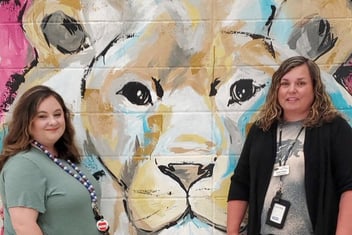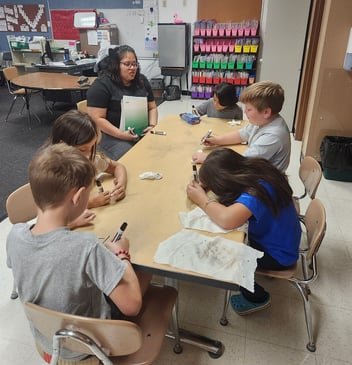Solving Arkansas' Teacher Shortage: Resilience in Wynne
The unexpected, however, the unpredictable: this is what builds a definition, what forges an identity. Jessica Williams, a lifelong Wynne resident, has been shaped by it. She never expected, for example, to become a downtown shop owner, to run a store she wandered into one mild Wynne afternoon.
“We’re fixin’ to leave,” the owner said, “any chance you’d be interested in buying the place?” Williams only wanted one t-shirt. Suddenly her whole life was t-shirts.
“We didn’t even mean to,” she explains. “It just happened.”
The pandemic, which closed the shop, of course gave no one a heads-up. It had been a successful ten years, but there they went, and that chapter was suddenly over. “Nobody cared about new clothes or jewelry anymore,” she laments.
One of her regulars, however, was an assistant principal in the Wynne School District. Williams suddenly found herself back in her old stomping grounds, in the hallways of her youth, turning the page. “I had always wanted to teach, and I asked if anything was opening-up,” she explains. “I was hired as a library aide, and I had never worked in a school…”

That was last year.
This year? Spring, in its suddenness, brought Wynne a significant storm. On the evening of March 31, a tornado ripped through Wynne, killing four, leveling homes, and leaving several businesses, as well as the high school, in a pile of ruins. It was as abrupt as it reads, and the winds came in at 165 miles per hour. The unexpected required a response, and there’s no better teacher than experience. Williams, naturally, was up and moving. Everyone helps everyone.
“If you were out there, you were getting fed,” Williams explains. “My husband had already left. He works in natural gas, which was blowing, and if someone lights a match… so he had to go immediately, and we still didn’t even know if more tornadoes were coming.”
Williams ended up at the Intermediate school, trying to link-up with co-workers, trying to find a way to help. “We ended up grabbing a short bus. We were out there in the neighborhoods with food and hygiene kits. Houses were just gone.”
The 31st was a lifetime in the making for Williams. A hometown is often a place you can’t wait to leave, and then can’t wait to get back to. But Williams has adored Wynne since childhood. She was called to serve long before any sirens.
She tried Arkansas State (ASU), up in Jonesboro, for a year after high school. She talks about it now as if her prompt return to Wynne was always a foregone conclusion. “This is just my spot,” Williams says. “It’s me. My daughter doesn’t feel that way; my best friend in high school didn’t feel that way. But you could not pay me to leave,” she says, “unless someone wins the lottery, and maybe I end up on a beach somewhere, this is it for me.”
While staying might have always been understood, the path to teaching at Wynne Intermediate School (Home of the Yellow Jackets!) was not a particularly well-executed vision. Williams is very open about her, “fraught” we’ll call it, relationship with education. “I was not a good student,” she admits with a laugh. She adds: “My dad was forty when he had me, I was the last of four kids, and he was over it. They said ‘This one is going to raise herself.’’’
Still, Williams knew she wanted her degree. Jonesboro was her first at-bat, but it did not go well. Again, she’s not describing an outcome that confuses her. Not in the least. “I was seventeen when I graduated high school. So at ASU, whatever the lowest GPA is, I had it,” she laughs. “So my butt got sent home.”
Williams was down, yes, but not out. She’s from Wynne. Fall down nine times, stand up ten.
“I did end up getting my associate’s from EAC (East Arkansas Community College) over in Forrest City. And then I got accepted back at ASU. I was actually accepted into the education program there. I decided I wanted to teach. But then…”
Of course “but then”: of course! The page turned, all of a sudden, and a new chapter was unexpectedly beginning.
Williams had found her person, and so Arkansas State never happened: no second trip up Highway 1 was meant to actualize. It’s how she ended up in a t-shirt store in Wynne, her happy place, instead of raising her hand in Jonesboro. “My oldest was five when we bought that shop,” she explains. “I literally went in there to purchase a t-shirt.”
Fast forward to now, and Williams has found a pathway to her bachelor’s degree, one suited perfectly to her life’s particulars. The opportunity appeared, naturally, in the continued suddenness of ongoing life, and she now finds herself in a position to offer Wynne the same hometown spirit that she’s always cherished. She attends Reach University through a remote, job-embedded curriculum: a paid apprenticeship en route to her degree. Following a mad scramble to meet last year’s application deadline, Williams was admitted on June 3rd, her birthday.
 Kaley Boeckman (left) and Jessica Williams (right) of Wynne Intermediate School.
Kaley Boeckman (left) and Jessica Williams (right) of Wynne Intermediate School.

